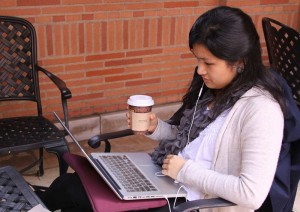Students react to potential coffee price increase
Since sixth grade, Leanne Gutierrez, a sophomore majoring in public relations, has been drinking coffee to stay up to do homework. She now drinks three to four cups each day. Were coffee prices to rise, Gutierrez said she would feel the effects.

Cup of Joe · Nadine Tan, a senior majoring in business administration with international relations, studies outside LiteraTea drinking coffee. Coffee prices might rise. - Katelynn Whitaker | Daily Trojan
“[Price increases] would really affect me, especially since I’m a student,” Gutierrez said. “I have a limited income.”
This situation could quickly become a reality, as experts and big corporations, including Starbucks, warn that climate change and other factors pose a significant threat to the supply of coffee and chocolate, a trend already leading some companies to raise prices.
“There are changes in climate, but also in [land distribution] and drought trends,” said Roger Clemens, a former USC professor and chief scientific officer at ET Horn, a distributor of raw materials and ingredients.
In response to declining production, several supermarket coffee companies, including Maxwell House and Folgers, increased prices by more than 25 percent between 2010 and 2011.
Many students said they would not alter their coffee drinking habits as a result of raised prices.
“I personally don’t think it would affect me,” said Tiffany Chang, a senior majoring in biological sciences. “If I had to pay more, I’d still drink it because I need coffee.”
Another threat to coffee beans is a disease killing insects that pollinate the crop, Clemens said.
“We call it colony collapse,” he said. “If you don’t have the insect population, you can’t get the plants pollinated.”
Another highly demanded product, chocolate, might become much more expensive, according to a report from the International Center for Tropical Agriculture and funded by the Bill and Melinda Gates Foundation. According to the report, the supply of cocoa could plummet because of rising temperatures in West Africa.
As many would with coffee, students would continue to find ways to eat chocolate in the case of a shortage or price hike.
“I wouldn’t eat less chocolate,” said Emily Frank, a sophomore majoring in business. “I love chocolate.”
With population expected to increase from 7 billion to 9 billion in the next 30 years, countries will have to consider the trade-offs between producing coffee and essential food items, Clemens said.
“You will see a tremendous change in agriculture and coffee is one of those crops that is going to change,” Clemens said. “Do you want to grow coffee, or do you want to grow lettuce or fruits, or the foods that can actually supply nutrition?”

The correlation between climate and a 25 percent increase in coffee prices is unfounded. A better conclusion lies in the profit margin for big business. Let’s not fool ourselves.
An interesting thought about the how the climatic change is having an effect on coffee production. The consequences to the coffee farmers could affect them substantially. I’m pleased that many are prepared to accept the higher price, as that will continue to help the coffee farmers for the time being.